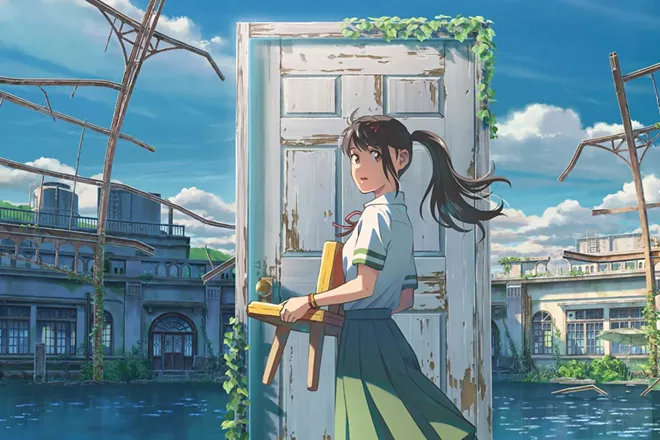If you're living in a Makoto Shinkai film, disaster is never far away.
In 2016's Your Name, a fragment of a comet threatens to destroy an entire community in a fictional Japanese town by the water. In 2019's Weathering with You, an unending rain may end up submerging the entire city of Tokyo.
With his latest film, Suzume, it is enormous supernatural worms. They travel almost entirely sight unseen between dimensions and have the power to cause massive earthquakes. The only ones who can stop them are high schooler Suzume (Nanoka Hara) and her new friend Souta (Hokuto Matsumura), whom she meets almost seemingly by chance when biking through her small town. As they travel across Japan, discovering much about themselves and the places they visit along the way, they will have to take on worms that grow larger in stature until they threaten to obliterate all that we hold dear in this fragile world.
To those unfamiliar with the director's work, this could easily sound like a bit of fun little road trip anime. This wouldn't be an entirely incorrect assessment as there is plenty of joy to be had. However, the real splendor of a Shinkai film comes from how he gently reflects on the catastrophes right at our doorstep just as he lovingly embraces the characters who are facing them in their day-to-day existence. The ordinary aspects of life, be it cramped subway cars or humble apartments, are animated with just as much attention to detail as the supernatural beings that tower over them. While much of the film's visual language will be familiar to anyone who has seen his past works, Shinkai pushes himself to dive even further into the magical. Most importantly, whether in spectacular sequences on a ferris wheel or ones where the viewer get ripped through space itself, he never loses sight of the characters.
Even when they get suddenly turned into a chair.
This isn't a joke. Or, at least, it's not one that the film relies on solely for slapstick purposes, as it also takes on a more sentimental quality. The details of why this occurs are best left to be experienced in the film, but suffice to say, Souta becomes trapped as a chair for a large part of the story, and that carries with it a personal significance for Suzume. Much of this is wonderfully silly as we see this chair doing everything from sprinting at full speed to it falling down face... or rather seat first when Souta falls asleep. At the same time, the longer we sit with this predicament the more it takes on an almost poetic tone.
This is true for the film itself, too. There is a sweetness to the experience, interwoven with a sense of somberness over loss. This is loss not just of lives, but of all that makes life worth living. In every gorgeously animated sequence, be it immense in spectacle or more grounded, Shinkai brings an infectious affection for the places and people that we encounter on this journey. The film feels like a mourning for a beautiful world that is increasingly falling out of balance. But, as the director has made explicit before, it contains a vibrant hope for the future. Though abundantly similar to his previous films, it is fresh enough to never feel derivative.
Suzume is not quite as outstanding as Your Name, but is a significant step above Weathering with You. There are moments toward the conclusion when momentum grinds to a halt and the film struggles to pick up the pace again. It dulls the brilliance of all that preceded it ever so slightly, holding it back from being truly great when it was very much on the road to being so. Still, the merging of the magical with the emotional makes for an experience that is richly textured when it counts. It serves as another shining work of animation from Shinkai, one that shows there will always be something valuable about taking in visuals created with such meticulous care. Even greater than that, Shinkai proves to be one of the few filmmakers (maybe the only one?) who could make the story of a girl and her trusty chair doing battle with giant worms into a reflective tableau on loss. ♦





















